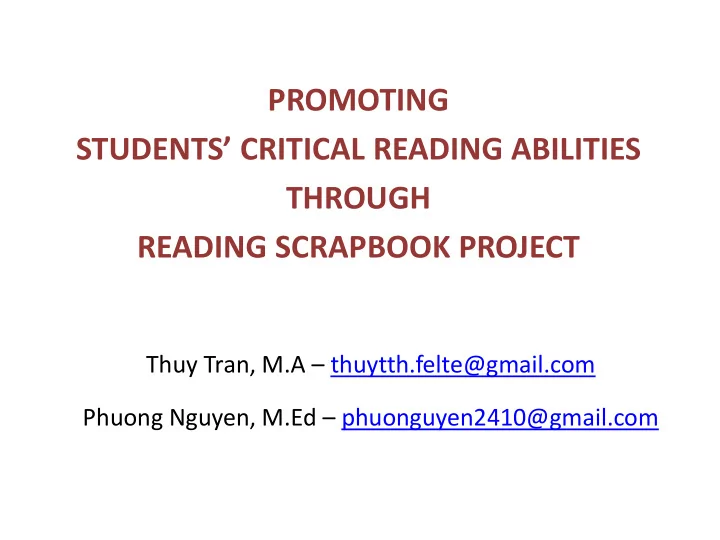

PROMOTING STUDENTS’ CRITICAL READING ABILITIES THROUGH READING SCRAPBOOK PROJECT Thuy Tran, M.A – thuytth.felte@gmail.com Phuong Nguyen, M.Ed – phuonguyen2410@gmail.com
Content • Rationale • Literature review • Methodology • Results and discussion • Conclusion
Rationale Within teacher A wider context training curriculum General language The trap of proficiency requisite information overload English Teacher Proficiency requisite
“ Inforbesity ” (Toffler, 1970)
(Common European Framework of Reference for Languages)
English Language Teacher Competency Framework
Rationale Within teacher A wider context training curriculum A need for developing General language The trap of CRITICAL proficiency requisite information overload READING English Teacher ABILITIES Proficiency requisite The Reading Scrapbook Project For Second year Students of BA Honors Program at FELTE - ULIS
Research questions RQ1: What principles of critical thinking development are featured in the Reading Scrapbook project? RQ2: From students’ perspective, to what extent did the project succeed in assisting them to develop their critical reading abilities? RQ3: From students’ perspective, what else can be done to enhance the effectiveness of this project?
Literature Review Critical thinking and Critical reading Critical reading at C1 level (CEFR) Critical reading as an indicator of English Language Teacher Competences (ETCF) Project-based learning
Critical thinking and Critical reading Principles of Environment for Critical thinking development (1) stimulating students’ interest, (2) creating meaningful discussion, (3) exposure to thoughts and views of others, and (4) fostering a trusting and supporting atmosphere Meyers (1986) Reading to develop critical thinking abilities - Fostering language growth - Developing logical reasoning in communication - Brings about insights into literature (King, 1968, p.5)
Critical thinking and Critical reading Critical reading…. - is the process of reading that goes beyond just understanding a text. owll.massey.ac.nz/study-skills/critical-reading.php Critical reading skills involves… “ analyzing the data source, understanding the writer’s purposes, distinguishing facts from opinions, reasoning, forming judgements, and detecting propaganda devices. ” (Vu, 2015, p.16)
15 questions that a critical reader needs to answer in reading any text: 1) What is the writer saying? 2) What do you think the writer is suggesting or implying? What makes you think so? 3) What is the writer’s purpose? 4) What audience is the writer suggesting? 5) Is the writer responding to another writer’s ideas? 6) What is the writer’s main point? 7) How does the writer support his or her points? 8) Does the writer use facts, opinions or a combination of the two? 9) Does the writer include enough supporting details and examples? 10) What pattern of development does the writer use to arrange his or her ideas? Is this pattern the best choice? 11) Does the writer seem well informed? Reasonable? Fair? 12) Do you understand the writer’s vocabulary? 13) Do you understand the writer’s ideas? 14) Do you agree with the points the writer is making? 15) How the ideas presented in this section like/ unlike those presented in other sections you’ve read? (Kirszner & Mandell, 2000, p. 485, cited in Vu, 2015, p. 16)
Methodology Research Methodology Research validity Setting and participants Data gathering Data analysis
Methodology • Mixed methods: quantitative and qualitative ⇒ neutralize or cancel the biases of single methods (Creswell, 2009) • Data collected chronologically in phases Two-phase Sequential Mixed Methods (Creswell, 2009) : - Phase 1 : The Survey Questionnaire given to second-years students of BA Honor Program at the end of second semester. - Phase 2 : Semi-structured interviews with randomly selected students.
Methodology: Research validity: - Use multiple sources of evidence => ensure the construct validity - Results from survey questionnaire provide statistical generalization => achieve the external validity
Methodology Setting & participants - Setting: FELTE, ULIS - Participants: nine-teen 2 nd -year students of BA Honor programs
Methodology Data gathering methods - Survey questionnaire - Interviews Data analysis methods Statistical and thematic data analytic techniques.
RESULTS AND DISCUSSION
Research question 1 What principles of critical thinking development are featured in the Reading Scrapbook project? Principles of environment (Meyers, 1996) (1) stimulating students’ interest: +project conducted over the semester + covers themes in the reading program + ss free to choose authentic texts (2) meaningful discussions with teachers and peers throughout semester (3) exposed to thoughts and views of others + triangle feedback/ comments which are open to discussion (4) building a trusting and supporting learning environment + working under close guidance of teacher + being guided by the list of 15 questions
Research question 1 What principles of critical thinking development are featured in the Reading Scrapbook project? Guiding questions and their correlation to elements of critical thinking development (King, 1968) [hyperlink to .docx file]
Discussion of Research question 1 - The instruction for Reading Scrapbook project closely features the principles of critical thinking development. - Guiding questions that lead students through the completion of the project can be mapped with elements of critical thinking that can be fostered through reading.
Research question 2 From students’ perspective, to what extent did the project succeed in assisting them to develop their critical reading abilities? Table 2: Students’ rating on the Reading scrapbook project
Discussion of Research question 2 • Enhance the Students’ critical awareness • Improve critical reading skills => The project was successful in term of its primary focus
Research question 3 From students’ perspective, what else can be done to enhance the effectiveness of this project? - Collaborate critical reading skill with other section of the curriculum (writing, speaking) - Emphasize more on in-time feedback from teachers and peers - Put less focus on tradition assessment tool (reading test with multiple-choice questions)
Conclusion • The reading scrapbook project goes in line with principles for critical thinking development. • The project did help students improve their critical reading skills. • Collaboration (Ss – Ss; T – Ss) needs to be foster to situate critical reading across .
Future research • Develop a rubric to assess critical reading skills • Use the rubrics to analyze students’ levels of critical reading exhibited in their scrapbooks • Involve more participants
Q & A
Recommend
More recommend